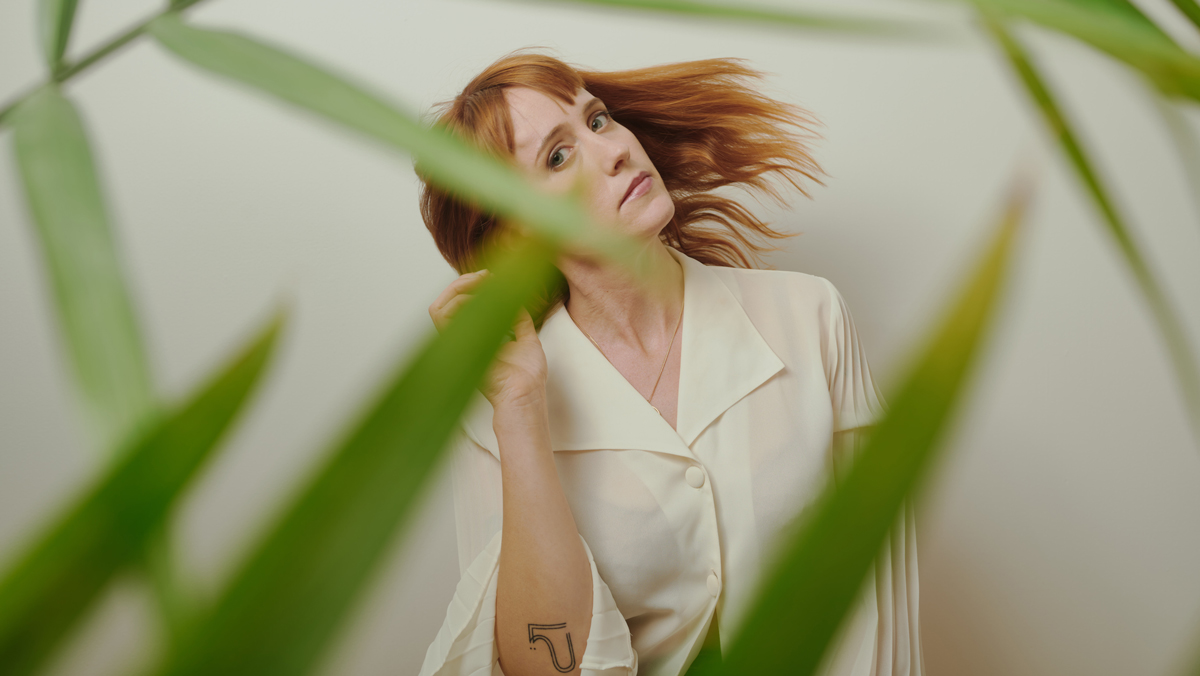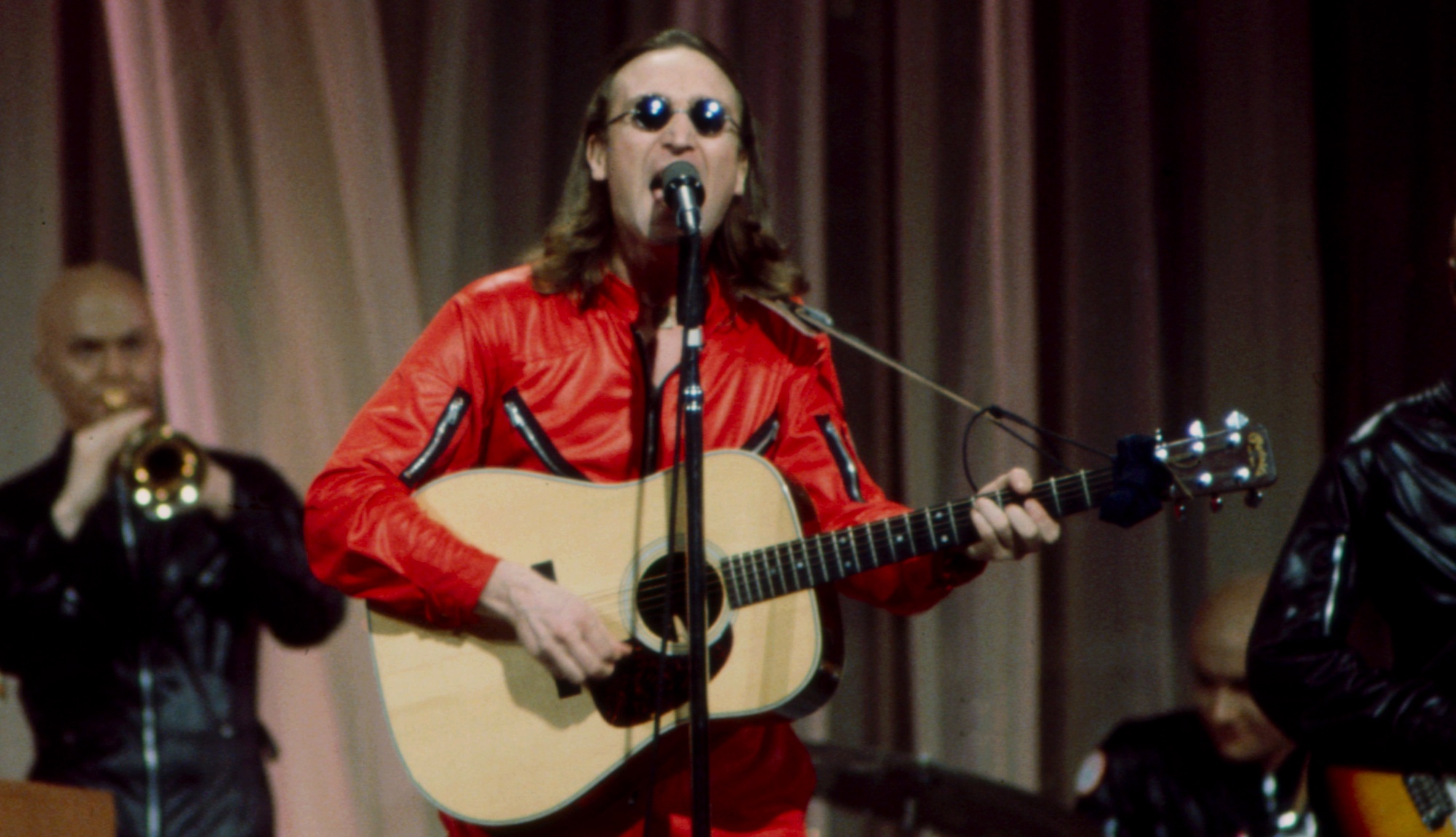Flock of Dimes' Jenn Wasner: “I'm such a fan of altered tunings. That's one of my favorite things about guitar – the malleability of it”
The Wye Oak guitarist and songwriter on the gear, ideas and thorny creative process behind spellbinding new Flock of Dimes album, Head of Roses

All the latest guitar news, interviews, lessons, reviews, deals and more, direct to your inbox!
You are now subscribed
Your newsletter sign-up was successful
The term ‘isolation’ has taken on visceral meaning for many amid the pandemic. In early 2020, Jenn Wasner – the guitar talent and songwriter behind Wye Oak – found herself dealing with the compound impacts of a painful breakup, the sudden solitude of her home in the North Carolina woods, plus the existential crisis that faced all musicians, as touring became a memory.
For Wasner, as for many of us, it created the space for some awkward, long-ignored personal questions to rear their heads. She reacted, almost instinctively, by writing music – emerging from this somewhat challenging transformation with a new solo album (under her Flock of Dimes moniker), Head Of Roses.
The record is a stylish yet starkly honest amalgam of Wasner’s soul-searching introspection and multi-instrumental wizardry, merging dappled synth lines and woozy six-strings into bright cathartic compositions.
“The last year has changed my relationship to myself, pretty fundamentally,” says Wasner. “It's also changed my relationship to my creative practice, pretty fundamentally. It's been an eye opening period of time, on a number of levels…”
How has the pandemic changed the way you think about yourself as a musician? When you take away that feedback loop of performance, what happens next?
“Well, I think there's a separation between musician as identity [and who you are]. It is what I do. It is not who I am, necessarily. So it is a big part of the way that I see myself and the way the world sees me and then there is the part of it that is more internal and personal.
“I feel like the part that I was separated from by the pandemic was the forward-facing identity part, but I actually ended up deepening my relationship to the part that is more personal.
All the latest guitar news, interviews, lessons, reviews, deals and more, direct to your inbox!
“Fortunately, that’s the part of it that I think is actually the most important to me. It's been a painful year, for sure, and a lonely one, but I'm extremely grateful for the ways in which it's brought me back to myself.”

We’ve all been trying to find the positives in the last year and, indeed, you were able to produce Head of Roses out of it, but it’s a different thing to live through in the moment. What was it like for you?
“My particular situation was that I was going through a really difficult breakup, and [at the same time] I was forced to leave all those coping mechanisms behind. I didn't have a job, my identity felt more tenuous than ever before. I couldn't see my friends. I couldn't see my family and I was alone.
“It was a fundamentally life-altering experience. [It forced me] to dig into the layers of my own personal traumas, from my upbringing – to really look at those for the first time and see the ways in which they were unconsciously shaping my sense of self and my behavior in the world.
“However, the cool thing about songwriting is that you can be creating this thing that is derived from your own personal inner world. And then when you step back from it, it begins to explain truth about the world.
“It becomes a way of learning about people and things other than just yourself and your own experience. And that's why I do this. That's like the best-case scenario…”
How did the music that became this new Flock Of Dimes record fit into that period? When did that actually start to come?
“The music part of it was pretty early in the process. Most of these songs were written when I was very much in this white-hot grief stage, and not able to see outside of my pain or imagine that I could feel differently. In those moments, music was the only thing that I really knew how to turn to because it was the only thing that really seemed to work.
Not everything has to be agonized over to be worth sharing with others
“I think, the groundwork that I had laid for most of my life around having a creative practice really showed up for me in that moment, because I wasn't really all there, but I knew what to do. I wasn't thinking too much but the feeling of creating something was a distinct comfort to me at that moment.”
Awake For the Sunrise – which is a strikingly direct, simple acoustic song – feels very different to your past work. You’ve said it was written at 6:30am, so it would seem to be a very different creative process, too. Would a song like that have happened without these circumstances?
“Absolutely not. I don't think I would have allowed myself to write a song like that. That song was written at a time when I really wasn't sleeping very much and there was a lot of very physical pain – like you know when your emotional pain manifests physically? It was like there was like a small animal trying to claw its way out of my chest.
“Around then, I had agreed to do this song at a day club, with this group of really amazing, inspiring people. In the process of something like that, you have to relax your standards a little bit and just kind of let whatever happens happen.
“So that song is very simple. It's very direct, it's very much like it's kind of just like, the sad country song in a way. And I wrote it in probably half an hour, when the sun was rising and I had been laying awake for a long time and I thought it would be comforting to just strum my guitar in bed.
“I could imagine getting myself to overthink it [any other time], but I was exhausted, I was miserable, I was sad – and I just couldn't get in my own way. So I think that that's like the energy of it. I'm also happy that I was able to not to write it off just because it's simple. Not everything has to be agonized over to be worth sharing with others.”
What was your studio space or working environment like for this record?
“There were a couple different spaces. My home studio situation is just a bedroom. It's totally crammed full of equipment. I've got an Apollo 8P interface, a computer, a little bass amp, my [Vox] AC15.
“I've got a couple of guitars, my bass, my drum kit. A handful of microphones, a little table of electronics… So that's my home base, it's nothing fancy, but I tend to like record and write simultaneously, so I will have pretty fleshed out demos of everything.
“The record itself was recorded at a place called Betty's, which is a place that is very, very dear to my heart. My friends, Nick [Sanborn] and Amelia [Meath] have a band called Sylvan Esso and they live down the road so are, literally, my closest friends.
“Nick co-produced the record with me and just before this began they finished construction on a studio in the woods, where we live in North Carolina. That's probably the reason why this record exists because I was able to go out there and work on music safely and not travel. I was the first person to be able to make a record there, which was a real honor for me.”
What were you using on the guitar side for this record?
“Well, one of the guitars that I use a lot on this record was actually a guitar that I've owned for a really long time. It is this old, beautiful semi-hollow body Harmony Rocket. It's got the Bigsby tremolo and it's absolutely gorgeous, but it was just never the right guitar for the moment.
I am totally joined at the hip with my Fender Mustang Bass
“For this record, though, and for a lot of Wye Oak stuff that I'm working on now, it’s just come screaming to the forefront. It sounds a bit more gentle and fragile. It has this much more like, gradual, somewhat brittle, beautiful warm kind of flavor.
“This whole record just feels like there's a little bit more gentleness to it, some softness, and it just kind of felt right.”

And was there anything else that you leaned on a lot in this record?
“For Price Of Blue, it was like a multitude of guitars! I used Nick's dad's '80s Strat for the lead guitar on the guitar solo. And the Harmony was layered in. And also my Reverend model that they made it for me, I used that a bunch on that – I can't say enough good things about Reverend as a company, I love their guitars.
“And then I used my little Alvarez acoustic guitar for the like weird layered acoustic that comes in at the end.
“Also, I know it's not a guitar, but I leaned on the Moog Matriarch a hell of a lot on this record. It's one of my favorites synths that I've discovered in a really long time. And then I played all the bass on this record with the exception of one song, Walking, so I am totally joined at the hip with my Fender Mustang Bass.”
What about amps and effects for the record?
“We did a lot of running things through tube amps and then into larger cabinets. So it's kind of a blur really like I think it was very, it's very much dependent on what what we were needing in the moment. But my [Vox] AC15 was definitely in the mix. I think I used a [Fender Hot Rod] Deville a fair amount of well.
“Effect-wise, my pedalboard’s pretty minimal. But I have been using the Chase Bliss Warped Vinyl [a 'true pitch' vibrato/chorus] a lot. I really liked that pedal. And the Chase Bliss Thermae delay that they do.
“And I have I've also really attached to the Red Panda Particle, because it's just such a bizarre crazy sounding pedal, it can do so many different weird things. I also use a Moog MS Drive that I really liked, because it’s got tone control in addition to like just gain and master, so you can kind of tweak the frequencies a little bit.”
What were your tunings like on Head of Roses? You often have really interesting variations in your writing.
I'm such a fan of tunings. That's one of my favorite things about guitar, the malleability of it
“I'm such a fan of tunings. That's one of my favorite things about guitar – the malleability of it. So I often like to lightly tweak a simple straightforward tuning, like if you're in open D, but you tune the highest string up to E, so there’s a little bit of a tone cluster happening when you barre things. It's just like slightly different.
“The song Lightning is pretty much based around open tunings. There’s a capo on the second fret, because that's how I wrote it down for some fucking reason, and then it’s E B F# G# B F#. It's a weird little cluster.
“If you listen to the start of Lightning, it’s just me playing the open string starting at the A string all the way up and back down. Another one that I've been writing a lot in lately is C G C F G D, which is very odd.
“I like tunings in which I can do the majority of the fretting on the top four strings, and let the remaining two strings act as a strange like drone jangle. It kind of adds a certain complexity to the chords without you having to really do much work or be particularly good at guitar! [laughs] So my secret's out, that's how it's done!”
One term I noticed that's come up a lot in your interviews previously is this phrase ‘people pleaser’?
“Wow. Good catch…”
Has that changed at all, with the recent lack of people in our lives?
“You know, I think that it's very difficult sometimes to tune in to the difference between wanting to be kind and accommodating to others and being a ‘people pleaser’, which is the negative way of that of that tendency emerging.
“To me, being a people pleaser implies self-abandonment… a form of emotional manipulation. What it does suggest is that my ability to like myself hinges upon my ability to make others like me – and there's a certain disingenuousness to that.
Music matters. It is important to people. This is a gift that I have to offer to the world, however small
“So I think that saying ‘no’, when I know that it's the right answer, it does become easier when I feel a little bit more grounded in myself, and my value and my purpose as a human being. I feel less desperate to please or satisfy everyone around me all the time.”
Do you think this is the bravest record you’ve made?
“Bravery is relative. I wouldn't call myself brave in the way that someone who's showing up and putting their life on the line to protect other human beings is brave. But relative to what I've done in the past? Yeah.
“I get freaked out every time I put a record out and this one feels particularly vulnerable. So I am afraid and I am insecure. And I do hear the words coming out of my mouth sometimes and think, 'Oh, you absolute buffoon', or like, 'You sound like such an egomaniac!' I go through all of that every time I put a record out.
“But at the same time, music matters. It is important to people. This is a gift that I have to offer to the world, however small. This is the responsibility that I have – and I have to do it.”
- Head of Roses is out now via Sub Pop.

Matt is Deputy Editor for GuitarWorld.com. Before that he spent 10 years as a freelance music journalist, interviewing artists for the likes of Total Guitar, Guitarist, Guitar World, MusicRadar, NME.com, DJ Mag and Electronic Sound. In 2020, he launched CreativeMoney.co.uk, which aims to share the ideas that make creative lifestyles more sustainable. He plays guitar, but should not be allowed near your delay pedals.

![Flock of Dimes - Price of Blue [OFFICIAL VIDEO] - YouTube](https://img.youtube.com/vi/KWRjozAXqaw/maxresdefault.jpg)

